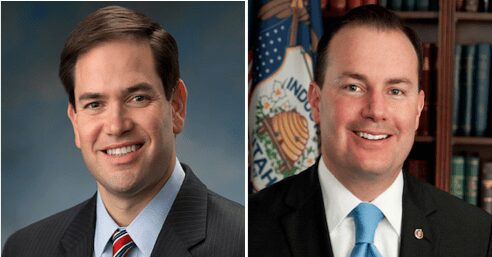
The Rubio-Lee Plan Is A Positive Step Forward On Tax Reform
Taxpayers Protection Alliance
March 11, 2015

Sen. Marco Rubio (R-Fl.) Sen. Mike Lee (R-Utah)
One of the most important issues facing the country right now is the need for real and comprehensive tax reform. The tax code is excruciatingly complicated and Congress must act in way that will help to grow investment for American businesses, but also positively impact working families. Last week, a step in the right direction occurred when Senators Marco Rubio (R-Fl.) and Mike Lee (R-Utah) released their plan for comprehensive tax reform, the Economic Growth And Family Fairness Tax Reform Plan, or as it is becoming known as, the Rubio-Lee plan.
The Taxpayers Protection Alliance (TPA) welcomes the Rubio-Lee plan and would like to see Congress take steps to working on making these reforms a reality.
In addition to overhauling personal and corporate income taxes, the Rubio-Lee proposal released last Wednesday, presents a statement of principles that takes into account the real problems with the current tax code, while addressing the legitimate concerns for businesses and families who feel the current system just isn’t working in a way that benefits innovation and investment. Principles of the proposal include making sure that all families are treated equitably, eliminating the code’s biases, boosting economic growth in the private sector, addressing cronyism, and reforming the IRS.
These are core principles that give a path forward to tax reform that will help bring money back into the American economy, but also put money back into the hands of hard working individuals who continue to be burdened by a complicated tax code.
The individual side of tax reform is important and fixing the complicated code is key, but corporate tax reform is also important and Rubio-Lee notes that the current corporate tax rate in the United States continues to be highest in the developed world. TPA has long been pressing Congress to reform the corporate tax rate and lower it so that businesses will invest, and in turn encourage greater innovation.
INDIVIDUAL TAX REFORM
Ryan Ellis of Americans for Tax Reform analyzed some of the important pieces that apply to individual tax reform:
Top personal rate cut to pre-Obama levels. The top personal income tax rate would be reduced from 39.6 percent to 35 percent. Exceptions obviously apply for business income (25 percent) and savings income (0 percent).
Simple two-bracket tax system. The first $150,000 of taxable income for married couples (half this for singles) would face tax at a 15 percent rate. All income earned above these levels face tax at a 35 percent rate. But see the business/investment exception rates above.
Kills the death tax. The plan fully eliminates the death tax.
Pro-family tax reforms. Creates a new $2500 child tax credit (on top of the current $1000 one) creditable to both income tax and payroll tax liability. No more marriage penalty.
Simplicity. Two brackets for individuals. The AMT is repealed. The standard deduction is repealed and replaced by a $4000 tax credit for couples (half that for singles). Only mortgage interest and charitable contribution deductions remain (these can be taken in addition to the personal credit). Most returns would be postcard-sized.
These reforms would be extremely beneficial for working families, and with the changes made to simplify the code; tax compliance would also be impacted in a positive way. The IRS Inspector General recently testified that the complexity of the code is one of main reasons for so much fraud in the current system. These changes would help to eliminate much of that fraud, which is costing taxpayers.
CORPORATE TAX REFORM
The Tax Foundation analyzed the corporate tax implications in the Rubio-Lee plan and how the plan would help the sluggish economy:
On the business side, the plan is strongly pro-growth by design. Instead of taxing net business income at our current high rates, it taxes business cash-flow at a top rate of 25 percent. This is the essential way to reduce the most growth-slowing aspects of our federal tax code:
- It cuts the corporate and non-corporate (or pass-through) business tax rate to 25 percent.
- It eliminates the double-tax on equity financed corporate investment, by zeroing out capital gains and dividends taxes.
- It allows businesses to immediately write-off their investments, instead of requiring a multi-year depreciation.
These are reforms that could spur growth not seen in the American economy for years. And, the time for tax reform is long overdue considering the code hasn’t been overhauled in nearly thirty years. Rubio-Lee provides a basis for reform and Congress should expand upon this proposal and begin a process where legislation becomes a reality and elected officials can vote to enact tax reform.
